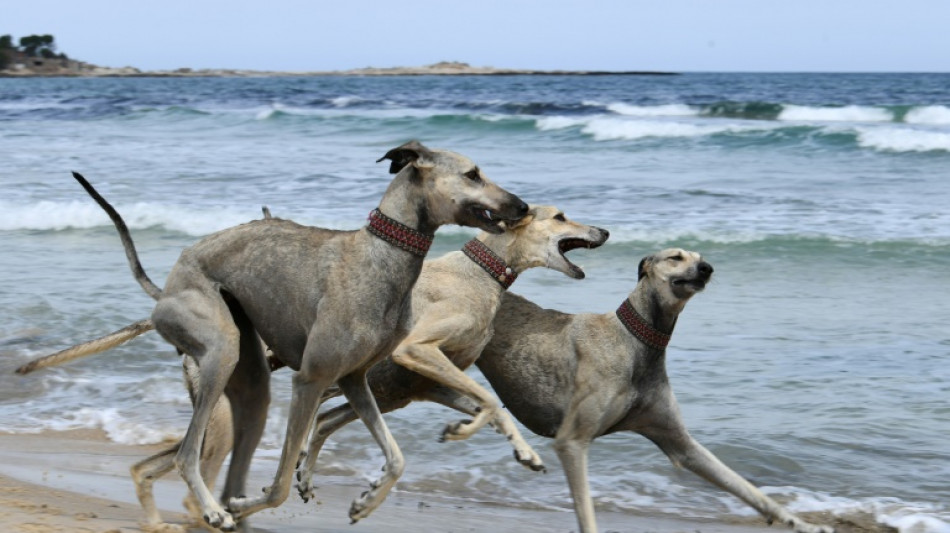
-
 Deadly storm sparks floods in Spain, disrupts Portugal vote
Deadly storm sparks floods in Spain, disrupts Portugal vote
-
Ukrainian flag bearer proud to show his country is still standing

-
 Carney scraps Canada EV sales mandate
Carney scraps Canada EV sales mandate
-
Morocco says evacuated 140,000 people due to severe weather

-
 Spurs boss Frank says Romero outburst 'dealt with internally'
Spurs boss Frank says Romero outburst 'dealt with internally'
-
Giannis suitors make deals as NBA trade deadline nears

-
 Carrick stresses significance of Munich air disaster to Man Utd history
Carrick stresses significance of Munich air disaster to Man Utd history
-
Record January window for transfers despite drop in spending

-
 'Burned inside their houses': Nigerians recount horror of massacre
'Burned inside their houses': Nigerians recount horror of massacre
-
Iran, US prepare for Oman talks after deadly protest crackdown

-
 Winter Olympics opening ceremony nears as virus disrupts ice hockey
Winter Olympics opening ceremony nears as virus disrupts ice hockey
-
Mining giant Rio Tinto abandons Glencore merger bid

-
 Davos forum opens probe into CEO Brende's Epstein links
Davos forum opens probe into CEO Brende's Epstein links
-
ECB warns of stronger euro impact, holds rates

-
 Famine spreading in Sudan's Darfur, warn UN-backed experts
Famine spreading in Sudan's Darfur, warn UN-backed experts
-
Lights back on in eastern Cuba after widespread blackout

-
 Russia, US agree to resume military contacts at Ukraine talks
Russia, US agree to resume military contacts at Ukraine talks
-
Greece aims to cut queues at ancient sites with new portal

-
 No time frame to get Palmer in 'perfect' shape - Rosenior
No time frame to get Palmer in 'perfect' shape - Rosenior
-
Stocks fall as tech valuation fears stoke volatility

-
 US Olympic body backs LA28 leadership amid Wasserman scandal
US Olympic body backs LA28 leadership amid Wasserman scandal
-
Gnabry extends Bayern Munich deal until 2028

-
 England captain Stokes suffers facial injury after being hit by ball
England captain Stokes suffers facial injury after being hit by ball
-
Italy captain Lamaro amongst trio set for 50th caps against Scotland

-
 Piastri plays down McLaren rivalry with champion Norris
Piastri plays down McLaren rivalry with champion Norris
-
ECB holds interest rates as strong euro causes jitters

-
 Spain, Portugal face floods and chaos after deadly new storm
Spain, Portugal face floods and chaos after deadly new storm
-
EU close to sealing trade deal with Australia

-
 German Cup final to stay in Berlin until 2030
German Cup final to stay in Berlin until 2030
-
What does Iran want from talks with the US?

-
 Taming the lion: Olympians take on Bormio's terrifying Stelvio piste
Taming the lion: Olympians take on Bormio's terrifying Stelvio piste
-
Wind turbine maker Vestas sees record revenue in 2025

-
 Italy's Casse tops second Olympic downhill training
Italy's Casse tops second Olympic downhill training
-
Anti-doping boss 'uncomfortable' with Valieva's coach at Olympics

-
 Bitcoin under $70,000 for first time since Trump's election
Bitcoin under $70,000 for first time since Trump's election
-
'I am sorry,' embattled UK PM tells Epstein victims

-
 England's Brook predicts record 300-plus scores at T20 World Cup
England's Brook predicts record 300-plus scores at T20 World Cup
-
Ukraine, Russia swap prisoners, US says 'work remains' to end war

-
 Wales' Rees-Zammit at full-back for Six Nations return against England
Wales' Rees-Zammit at full-back for Six Nations return against England
-
Sad horses and Draco Malfoy: China's unexpected Lunar New Year trends

-
 Hong Kong students dissolve pro-democracy group under 'severe' pressure
Hong Kong students dissolve pro-democracy group under 'severe' pressure
-
Germany claws back 59 mn euros from Amazon over price controls

-
 Germany claws back 70 mn euros from Amazon over price controls
Germany claws back 70 mn euros from Amazon over price controls
-
VW and Stellantis urge help to keep carmaking in Europe

-
 Stock markets drop amid tech concerns before rate calls
Stock markets drop amid tech concerns before rate calls
-
BBVA posts record profit after failed Sabadell takeover

-
 UN human rights agency in 'survival mode': chief
UN human rights agency in 'survival mode': chief
-
Greenpeace slams fossil fuel sponsors for Winter Olympics

-
 Greenpeace slams fossel fuel sponsors for Winter Olympics
Greenpeace slams fossel fuel sponsors for Winter Olympics
-
Kinghorn, Van der Merwe dropped by Scotland for Six Nations opener


Dying breed: Tunisian dog lovers push to save age-old desert hound
Nemcha, Zina and Zouina, three North African Sloughi hounds, play on the beach in Tunisia where their ancestors have long roamed desert plains, seemingly unaware of the existential threat to their dwindling breed.
The Sloughis, known for their speed and slender physique, have for many centuries accompanied nomadic societies across North Africa, and have been featured in art and lore dating back at least to the Roman era.
But nowadays breeders and advocates say that unregulated crossbreeding, the decline of nomadic lifestyles and habitat shifts due to urbanisation mean that they might soon disappear.
Olfa Abid, who was walking Nemcha, Zina and Zouina along the coast in northern Tunisia's Ras Angela, said the age-old breed is "part of our heritage, our history".
"We must protect the Sloughi," said Abid, a 49-year-old veterinarian, her arms wrapped around one of her dogs.
Recent years have seen a spike in unregulated crossbreeding, mixing the local Sloughi with other hounds often brought in from abroad to boost its speed for dog races, according to Abid.
National kennel club the Tunisian Canine Centre (CCT) has been working to raise awareness and safeguard the breed, including by creating a dedicated registry with a regulated breeding scheme.
The organisation's director Noureddine Ben Chehida said it also seeks to have the Tunisian Sloughi "recognised according to international standards" as a unique breed, under the guidelines of the International Canine Federation, the world's main dog breed registry.
Such recognition would give the local Sloughi population a place on the international stage and help preserve its lineage at home, Ben Chehida said.
Also known as Arabian Greyhounds, today the CCT estimates that fewer than 200 pure-bred Sloughis remain in Tunisia.
- 'Noble' hunters -
With their short coats in sandy hues or grey and arched backs, the hounds' swift gait has earned them a precious spot in Tunisian folklore even as the desert life they once supported gradually vanishes.
Historians debate how they first made it to this part of North Africa, but many attribute their arrival to nomadic tribes like the Mrazigs who live in the south of modern-day Tunisia.
For centuries, or possibly even millennia, the Sloughis have been vital companions to desert nomads, helping them hunt and guard livestock.
"Running like a Sloughi" is still a common saying in Tunisia.
"It's a noble dog that was the pride of its nomadic owners," said Abid. "It's a primitive hunter with a purpose when food was scarce."
She said the Sloughi has also had a more privileged standing compared to most dogs that are generally considered impure in Islamic cultures.
Unlike other breeds, Sloughis have traditionally been allowed indoors and would even eat beside their owners, said Abid.
- Ancestral heritage -
In the southern town of Douz, on the edge of the Sahara desert, dog breeder Nabil Marzougui said the "proliferation of hybrid breeds" is putting the Sloughis' future at risk.
"We inherited this dog from our forefathers," said Marzougui, calling for authorities to intervene to save the Sloughis as well as the ancestral tradition that they embody.
The hounds require ample daily exercise, especially where hunting is no longer available or needed.
This is why Abid said she had left the city to settle in the quiet coastal village of Ras Angela, on Africa's northernmost tip, where long stretches of sand serve as an ideal terrain for her three dogs to run around and roam free.
Their seaside adventures, which Abid shares on social media, are now followed by thousands of people online.
Hatem Bessrour, a 30-year-old agricultural engineer and the proud owner of a Sloughi named Cacahuete, called on fellow dog owners to register their pure-bred hounds with the national canine centre to support its breeding programme.
The breed is part Tunisia's heritage, he said. "We must care for it just like we care for antiquities and archaeological sites."
F.AbuShamala--SF-PST



